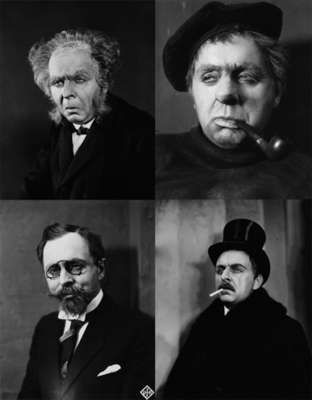Dr. Mabuse the Gambler

"There is no such thing as love, only passion! No luck, only the will to gain power!"—Dr. Mabuse
Dr. Mabuse the Gambler / Dr. Mabuse, King of Crime is a two-part German silent film from 1922 directed by Fritz Lang. It was adapted by the novel of the same name by Norbert Jacques, which was written to deliberately mimic and cash in on the popularity of Fu Manchu and Fantomas while delivering political commentary about Weimar Germany. It follows psychoanalyst and criminal mastermind Doctor Mabuse, who has gained wealth and control of Berlin through a vast and elaborate crime network that he uses for everything from counterfeiting and sabotage to manipulating the stock market through complex means. Eventually, Chief Inspector Norbert von Wenk begins to unravel the complex defenses surrounding Mabuse's identity and becomes determined to take him down.
The film was a major hit in Germany that helped elevate Fritz Lang's directorial career (enabling him to produce big-budget projects like Die Nibelungen and Metropolis) and turned lead actor Rudolf Klein-Rogge into a popular stock villain star. It is remembered today for its innovative narrative techniques, Expressionist imagery, complex commentary on the Weimar Republic, and for codifying many of the tropes associated with organized crime films.
Lang followed with the belated but highly acclaimed sequel The Testament of Doctor Mabuse in 1933, and the less well-regarded The Thousand Eyes of Doctor Mabuse in 1960. A series of inferior films was spun off from there in the 1960's and 70's, and a new Mabuse film is listed as "in development" on the IMDb.
- Action Prologue
- Battle Butler: Some of Mabuse's henchmen.
- Bond Villain Stupidity: Mabuse never tries to kill von Wenk by simple, efficent method. This leads to his downfall.
- The Chessmaster: Mabuse
- Crapsack World: Well, this is a Truth in Television, Weimar Germany wasn't a nice place.
- Diabolical Mastermind: An early example and one of the Trope Codifiers
- Driven to Madness: Mabuse, at the end.
- Driven to Suicide: Many times within the film
- Heroic Sacrifice: Carozza kills herself because of Mabuse's order. This trope is inverted, because not hero, but villain kills herself for evil goals.
- Hypnotic Eyes: This is a part of Dr. Mabuse's whole schtick, perhaps played most memorably in the card playing scenes ("YOU TAKE")
- I Have You Now, My Pretty: When Mabuse kidnaps Countess Told.
- Manipulative Bastard: Mabuse, again. He manipulates people to his own gain, drives them to suicide, and succesfully outsmarts police. Till the end.
- Master of Disguise: Mabuse; however, Lang intentionally makes these Paper Thin Disguises for the benefit of the audience.
- Morally-Ambiguous Doctorate: Mabuse is a respected psychoanalyst and hypnotist, talents he incorporates into his evil schemes.
- Rich Idiot With No Day Job: Edgar Hull, one of Mabuse's victims.
- Scream Discretion Shot: A silent example. After one offscreen instance of the aforementioned driven-to-suicide, one character walks in to discover the body. Cue titlecard: "BLOOD!"
- Shadow Dictator: Mabuse again, though he runs a criminal network, not a government
- Sympathetic Inspector Antagonist: Wenk.
- The Vamp; Subverted with Mabuse's lover, dancer Cara Carozza. She seduces men for evil goals, but not because she is evil herself, but for Mabuse, because she loves him.
- Villainous Breakdown
- Villain Protagonist
- Yandere: Carozza. She is so incredibly loyal to Mabuse, so she even commits suicide, when he orders her to do it.